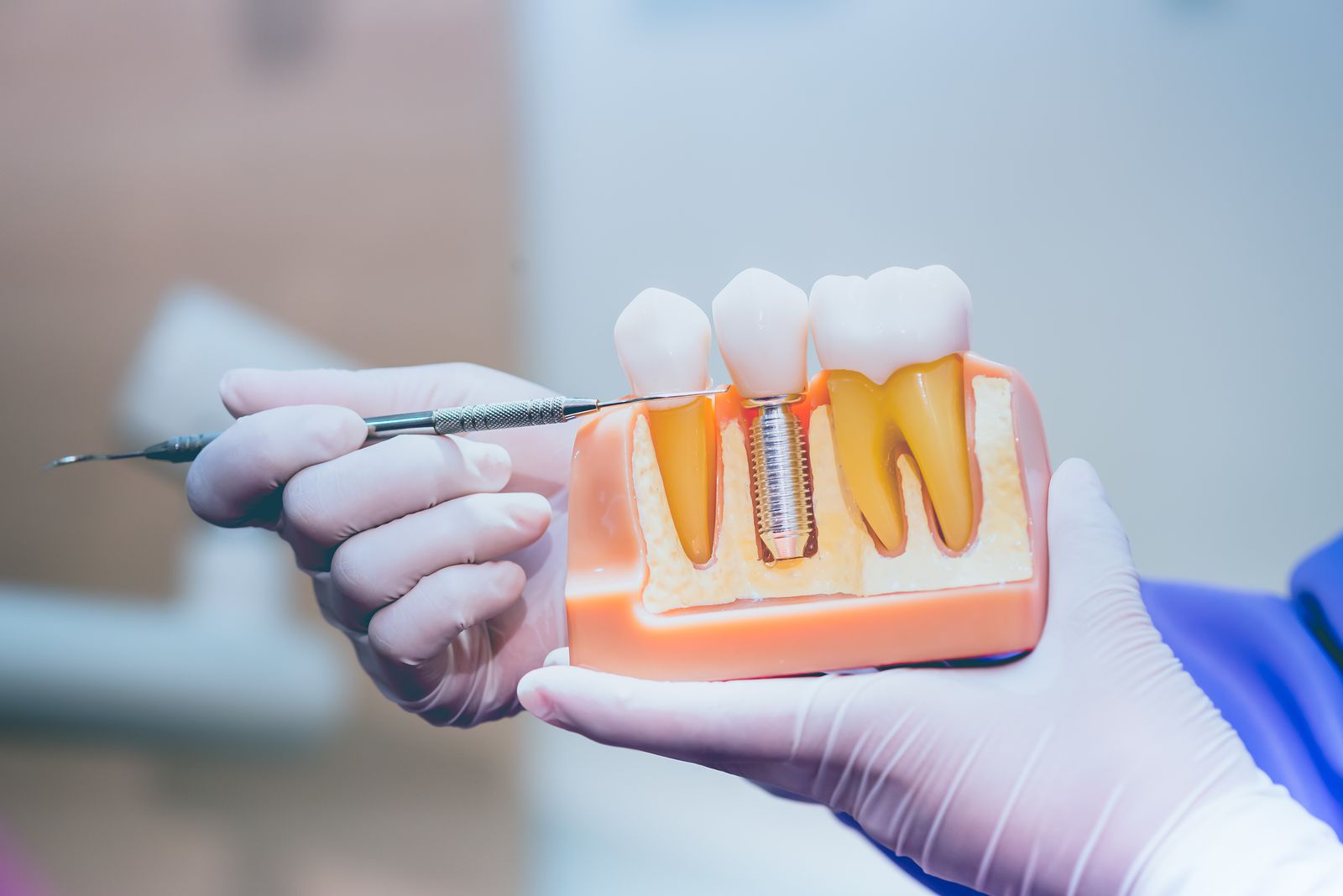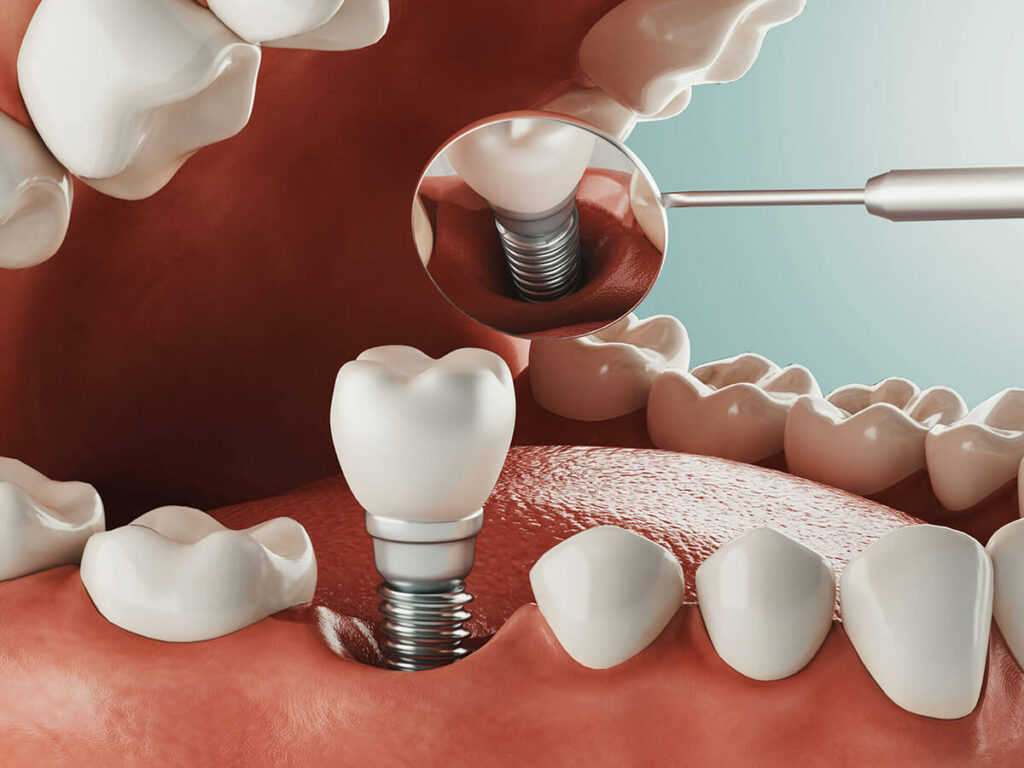Dental Implant Care Guide | Crown Point Dental
Teeth Replacement Dental implant centers in Columbus are now made to last a lifetime. A repaired smile, with proper care, can boost your confidence in forming new relationships. Even better, your new functional teeth can improve your connection with food.
Dental Implant Post-Operative Care
The days and weeks immediately following a procedure are crucial for effective dental implant maintenance. During this time, your body is hard at work repairing gum and bone tissue around the implant sites. This is also the time when the implant is osseointegrating with your jaw. To offer strong support for your prosthesis, the implant must integrate with the bone over time.
Our advice for caring for your new implants and bridges during this critical phase of healing is as follows.
Do not yank on the stitches. Allow the stitches to disintegrate or fall out naturally. Unless otherwise specified by your treatment coordinator, any stitches you may have will fall out or disintegrate on their own within 7–10 days. Never try to remove sutures by yourself.
Make use of ice. If swelling occurs, apply ice to the afflicted parts of the face. On the first two days after the procedure, apply ice for 20 minutes on and 20 minutes off. By the third day, you can use ice and heat alternately to treat muscle stiffness.
Ice should not be chewed. When using ice to minimize swelling, only use it on your face. Never put it in your mouth, and never, ever chew on ice.
Avoid being overly concerned. Over-inspecting the surgical site, for example, can sabotage the healing process. When you pull on your cheeks and open your mouth, you risk ripping the surgical area that is still healing.
Warm salt water should be used to rinse. Wait 24 hours following the treatment before starting salt water rinses.
Cleaning should be done gently. On the day of the New Teeth Now procedure, you may clean your teeth. Be extremely delicate. Brush your teeth with a soft-bristled toothbrush. This area will require time to heal. Again, be extremely cautious around the surgical site of the implant. Brushing the surgical site at the actual gum line surrounding the implant is not recommended. When cleaning your teeth, avoid swishing or spitting. You can rinse your mouth with water to help remove the toothpaste. Don't spit out the water. Allow the water to trickle out of your lips over the sink. Then wipe your mouth and you're finished.
Using a Monoject syringe, clean the gap. A gap between the implant bridge and your gums is likely to appear while your gums heal. You will gently wash food out of this gap using a curved-tip irrigation syringe. After 5-6 weeks, when the gums have fully recovered, you can use a water flosser instead of the syringe for a more thorough cleaning.
DO NOT CLEAN TOO MUCH. Over-cleaning is a typical overcare problem that can be just as terrible as not cleaning enough. Picking at a troublesome spot all the time does not help the healing process. Compulsive behaviors like these are more likely to compound problems, turning something minor into a major one.
For the first 24 hours, avoid using straws. Sucking, spitting, and swishing might aggravate the healing process, particularly on the first day. During this time, blood clots must form at the extraction site. Failure to adhere to this recommendation may result in an unpleasant dental condition known as a dry socket, which will lengthen your healing time. A dry socket occurs when a blood clot does not form, exposing the jawbone to microorganisms and air. This sensation is similar to throbbing jaw pain. This pain would become apparent 5-6 days following the operation. Call your implant provider as soon as you notice this pain. They will require your services for dry socket therapy.
Soft drinks should be avoided. Soft drinks or strong acidic liquids, such as orange juice or coffee, might irritate healing and contribute to the formation of dry sockets.
Eat only foods that can be sliced with the side of a plastic fork. During the healing period of the New Teeth Now procedure, a soft food diet is advised. Even food that appears to be soft, such as lettuce, might be difficult to chew.
Consume hot foods and beverages with prudence. The surgery will cause mild numbness for the first 24 hours. To avoid burns, exercise extreme caution when consuming hot foods, such as coffee, soups, and microwaved foods.
You should not smoke. Smoking is detrimental to dental implants. Active smokers are more likely to become infected after the surgery. Smoking reduces blood flow to the bone and tissue surrounding the implant. Without this supply, healing is hindered and the body's ability to fight infection is jeopardised.
Chew some gum. If you begin to experience chronic muscle stiffness where you are having difficulties opening your mouth as wide as you could before after a few days, consider chewing gum on a regular basis to assist relax up those jaw muscles.
Follow the instructions provided. This guidance should not be relied on solely for post-surgery treatment. Please continue to communicate with your surgeon or treatment coordinator. Never make assumptions if you have questions or are unsure about what is expected of you.
Give up smoking once and for all.
You can take the following steps to prepare for your treatment date: applies to apply here. Let's look at what makes long-term care unique. Fortunately, there are far fewer long-term care recommendations. We believe that, as many of our patients have discovered, care for full-mouth dental implants is simple and straightforward.
After-Surgery Dental Implant Care
Purchase an excellent water flosser. When it comes to removing debris from hard-to-reach nooks and crevices around your dental implants and bridges, these basic instruments work like magic. There is a little area between the bridge and the gums in full mouth implants that can gather debris while eating. With a soothing spray of water, a water flosser can gently massage away this accumulation.
Give up smoking once and for all. It's been said before, but it bears repeating. Tobacco use is detrimental to your dental health. Smokers are much more likely to become infected. As we all know, they are also at a higher risk of oral health concerns such as tooth loss and implant failure. Without making any other behavioural adjustments, quitting smoking is one of the best methods to increase the health and durability of your implants.
Do not neglect your cleanings. Even if you have prosthetic teeth, you will require routine cleanings. Dental implants continue to prioritise oral hygiene. A skilled dental hygienist will remove your teeth for cleanings and discuss your oral health issue with you if you are a New Teeth Now patient. Your teeth will be extracted only once because they are otherwise attached to the implants.
Wear your mouthguard according to the instructions. Please wear a mouthguard at night if you've been instructed to do so to reduce wear and tear from excessive teeth grinding and clenching.
Ice should not be chewed. Even with zirconia teeth, chewing ice after everything has healed is still inappropriate.
If you're having problems, come see us. If something feels off, don't ignore it. We can look into it, even if it's simply for your own peace of mind. Also, please do not try to fix a dental implant problem on your own. Operating on yourself at home is extremely unsafe and dirty. Googling a DIY solution is a recipe for disaster, with additional hassles and costs almost assured.
And Note
Crown Point Dental provides the latest dental Implants technology in Columbus, OH. Call our implant dentist at (614) 457-4303 to schedule an Appointment.





Comments
Post a Comment